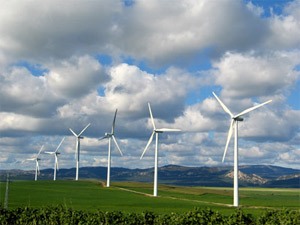 |
| A tax on carbon would increase the cost-competitiveness of alternative power sources. |
Did the concept of a carbon tax die with the Liberal Party’s fortunes in the most recent federal election?
Not exactly, say –¬º”∆¬¡˘∫œ≤ ø™Ω±÷±≤• economists. While acknowledging the challenges in implementing such a proposal‚Äîpolitically and economically‚Äîthey believe the idea still has great merit for helping to reduce greenhouse gas emissions in Canada.
“The issue is that burning carbon has further costs that aren’t reflected in its free-market price,” says Mathieu Dufour, PhD candidate. “Take, for example, the fact that more cars on the road can lead to more people suffering from asthma. Such costs are usually not accounted for in the price because they’re not included in the production costs. The idea of a tax is to try and get us closer to the real cost.”
A carbon tax, in principle, is simple: if you make the process of burning carbon more expensive at the production end, hopefully less of it will be burned. At the same time, the cost savings provide an incentive for both corporations and consumers to seek out carbon-reduced energy sources such as wind, solar and tidal.
More than 230 academic economists, including 10 –¬º”∆¬¡˘∫œ≤ ø™Ω±÷±≤• professors, signed a letter to federal party leaders this October, urging that putting a price on carbon would be the best approach to combat climate change. But while there is widespread agreement among economists about the value of a carbon tax, there is significant debate about how best to implement one. The biggest problem: how to minimize the effects on those who are overly dependent on carbon.
‚ÄúPeople in rural Nova Scotia have to use more carbon to get around,‚Äù explains Lars Osberg, chair of the Department of Economics.¬Ý ‚ÄúA fisherman on the south shore, he‚Äôs going to have to pay more to do his business. Agriculture would also face increased costs.‚Äù
Even if a carbon tax were revenue-neutral for government, it would be unlikely to be revenue-neutral across all households. The challenge for government is to find a way to use increased revenues to properly target tax cuts and programs towards groups who face an undue burden under such a system, particularly those in the lower income brackets.
That said, Ruth Forsdyke hopes that Canadians don’t forget the environmental consequences at stake. “Who suffered when the levees broke in New Orleans? The poor,” notes the assistant professor. “A carbon tax, in the short term, may provide some downsides to the less advantaged, which is why it’s important that government get the policy right.”
An alternative economic approach to climate change would be a cap-and-trade system, which would create a market for pollution permits that can be bought or sold amongst companies. Such a system may be more politically palatable, but is unlikely to cover as many polluters as a carbon tax. Regardless, any economic approach is going to require significant political will to implement.
“What we need to convince Canadians is that once we set a target, we can reach that target at a lower cost if we use cap and trade or a carbon tax,” says Melvin Cross, associate professor. “That’s the argument we need to sell.”
